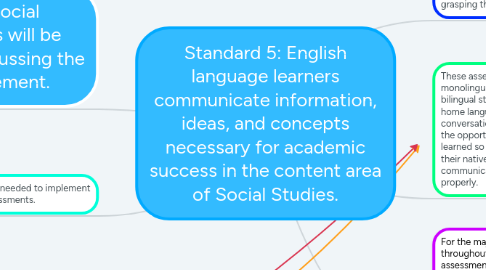
1. One thing that I'm critical about is that I am worried that my students might not respond to the formative assessments the way that I hope they do. I want these assessments to help them gather their ideas and also help them self assess as they're doing it and have them reflect on how well they are grasping the concept of the topic.
1.1. Another thing that I'm critical about is whether or not the type of assessment I am using is appropriate for emergent bilinguals. Am I proving the support they need? Is there any else I can do to have them incorporate their native language? Will students succeed in learning about the Civil Rights Movement with what I provided and be able to show their understanding of the content through assessment?
2. These assessments will differ from those of monolingual students in the aspect that bilingual students will be able to utilize their home language. Whether that be through conversation or on paper, students will have the opportunity to share what they have learned so far while having the chance to use their native language in order to help them communicate their ideas about the content properly.
2.1. By incorporating their native language into the curriculum, I am providing the proper accommodations and support for them to help them gather their ideas. I can also provide them with scaffolds in order for them to demonstrate what they know about the content. For example, if I utilize an Exit Slip as a formative assessment, I can use sentence structures on the Exit Slip to help them. I can also write the instructions and the questions in their native language to help them understand what is being asked.
2.1.1. This is beneficial in promoting multilingualism because students will have the chance to incorporate their native language in any assessment that is given. They will also receive instruction in their native language when we introduce new topics, prominent figures, ideas, etc. from the Civil Rights Movement in order for them to be able to understand the content.
3. For the majority of my assessments throughout this topic, I will make sure that the assessments are formative assessments in order for my students to get the most feedback as they learn about the Civil Rights Movement. By giving this form of assessment and receiving this immediate feedback, I am able to focus and help the students who are struggling.
4. For our topic in Social Studies, the class will be learning and discussing the Civil Rights Movement.
5. Resources needed to implement these assessments.
5.1. In order to implement different types of formative assessments for bilingual students, I first have to find out what type of formative assessments work best for ELL students. Although many formative assessments are great, there might be some that work best for students who are emergent bilinguals. I would have to do scholarly research on that.
5.1.1. Other resources I would need is to take important key words that we will be learning about during our topic of the Civil Rights Movement and make sure I get accurate translations and definitions of these words for my students in their native language. By having these, I will be able to give my bilingual students the support that they need in order to understand the content and be successful during the assessments.
5.1.1.1. Another important set of resources is for me to find books about the Civil Rights Movement in my student's native languages. If I utilize popular books for my class to learn from, they more than likely have various translations of them in different language. My students will have the chance to have the English copy of it and a copy in their native language.
